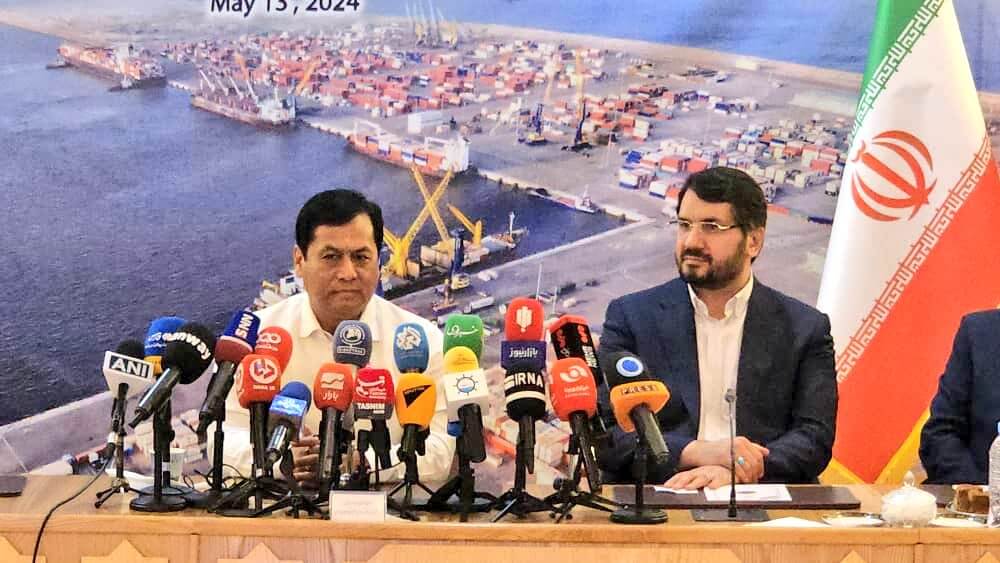On Monday, India signed a 10-year contract with Iran to operate the Shahid Beheshti Port Terminal at the strategically important Chabahar port in Iran. Following the move, the US warned India of “potential sanctions” over its dealings with Iran.
Long-Term Contract, $370 Million Investment
India Port Global Limited (IPGL) signed the long-term, bilateral contract with the Iranian Ports and Maritime Organisation (PMO). Under the agreement, IPGL will invest approximately $120 million in the project. It will enhance the port’s infrastructure by acquiring strategic equipment and expanding transport facilities at Chabahar to turn it into a dynamic regional hub for trade transit.
Hon’ble Minister @sarbanandsonwal MoPSW:” With the signature of this contract, we have laid the foundations of India’s long-term involvement at Chabahar” @MEAIndia pic.twitter.com/mMF8dqxKLt
— India in Iran (@India_in_Iran) May 13, 2024
Indian Union Minister of Ports, Shipping, and Waterways Sarbananda Sonowal visited Chabahar to witness the signing ceremony. His Iranian counterpart, Mehrdad Bazrpash, was also present at the occasion. Additionally, Sonowal met Iranian Foreign Minister Hossein Amir-Abdollahian and handed him a letter from Indian External Affairs Minister S. Jaishankar offering $250 million for Chabahar-related development. The agreement came a day after Jaishankar said that India expects to secure a long-term arrangement with Iran on the management of Chabahar.
At the signing, Sonowal said, “With the signature of this contract, we have laid the foundations of India’s long-term involvement at Chabahar.” The move came eight years after India and Iran concluded the general framework of cooperation on the port in May 2016. The pact will replace the one-year contracts that are being signed by the two sides to keep the port operational. The Iranian side appreciated the conversion of short-term agreements into a specific, long-term contract with India.
Alternate Gateway for Trade, Strategic Importance
The Chabahar Port, located in the Sistan-Baluchistan province on Iran’s southwestern coast, is easily accessible from India’s west coast and is strategically important for the country. The development of the Chabahar Port is an India-Iran flagship project. It forms a crucial link in the International North-South Transport Corridor (INSCT), a 7,200 km-long network connecting India, Iran, Russia, and Europe.
At the signing, Sonowal and Bazrpash reaffirmed their leaders’ shared goal of enhancing bilateral cooperation in connectivity projects and establishing Chabahar Port as a hub for regional connectivity. An official release said the contract will “further strengthen ties between the two nations and highlight the importance of Chabahar as a gateway for trade with Afghanistan and broader Central Asian countries.”
Notably, the port helps India bypass the ports of Karachi and Gwadar in Pakistan, thus reducing its dependence on the neighbour by providing an alternate transit route.
Lauding the move, Sonowal said that the agreement “places India’s firm footstep in the global supply chain and maritime sector.” He added that the route would enhance global trade by providing an alternate trade route to India and be crucial in delivering “humanitarian aid, opening new vistas in fostering peace and stability in the region.”
US Warns of Potential Sanctions
Responding to the signing of the deal, the US warned India of sanctions. Principal Deputy Spokesperson of the US State Department Vedant Patel said that the US is aware of the development. He stated that “anyone considering business deals with Iran, they need to be aware of the potential risk that they are opening themselves up to and the potential risk of sanction.”
US threatens India with sanctions over trade ties with #Iranhttps://t.co/84sb3nPgU8 pic.twitter.com/RALZCPlm7R
— IRNA News Agency (@IrnaEnglish) May 14, 2024
However, Patel clarified that he would let the Indian government “speak to its own foreign policy goals vis-à-vis the Chabahar port as well as its own bilateral relationship with Iran.” He reiterated that the US sanctions on Iran remain in place, and the country will continue to enforce them.
Earlier, the development of the port was delayed due to US sanctions, even though, in 2018, sanction waivers were given to India for the development of the port. Washington has imposed several sanctions on Iran over its drone and missile programs, the latest in light of its purported support to Hamas amid the Israel-Palestine conflict.

